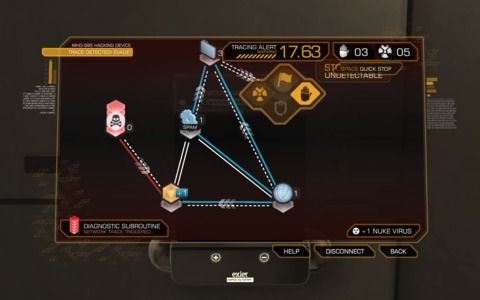An Intelligent Game For Those Who Want Choice

The original Deus Ex, released for the PC in 2000, is commonly considered to be one of the most ground-breaking action-adventure games ever developed. Famed for its cyberpunk thematics and giving players a variety of different ways to overcome challenges, it blew away reviewers and players alike. Deus Ex: Human Revolution acts as a prequel to the highly acclaimed original, proudly reviving the spirit of its predecessor in both its world and its gameplay, and setting itself in a gritty, dystopian future where human augmentation has become a viable but extremely controversial technology.
In Human Revolution you take on the role of Adam Jensen, the chief of security at Sarif Industries, a leading but highly criticised augmentations manufacturer. At the start of the game Adam’s colleague and romantic interest, Megan Reed, is on the cusp of presenting a revolutionary breakthrough in augmentations, but after terrorists attack Sarif Industries Megan goes missing, and Adam is left on the brink of death. To keep him alive Adam’s damaged body parts are replaced with augmentations and when he recovers to proper health he is left with a handful of questions, a conspiracy to uncover, a group of enemies to hunt down, and an obvious detachment from the society around him.
One of the most engaging things about Human Revolution is the way it uses its world and story to do something so many other games out there aren’t doing, and start exploring real-world issues and ideas. Much of the story focuses on the themes of corporate, governmental and media control, class disparity, and the possible advantages and disadvantages of human augmentation, and goes to some thought-provoking places with them. Characters act more as a means to embody ideologies and ways to move the story forward than anything else, and in line with the original Deus Ex some less plausible conspiracy theories enter into the picture later on, but the narrative of Human Revolution is still one to be highly praised, and benefits greatly from its almost disturbing visions of the future, which seem for the most part, eerily plausible. For those who enjoy searching every nook and cranny of a game and reading through additional text, the game also has heaps of newspapers, ebooks, emails, and other optional text littered around the world for you to dig up and enjoy.

The atmosphere and tone of Human Revolution is only improved by its stylistic choices, with the game presenting a world bathed in a distinctive black and yellow colour palette, full of detail, and including plenty of influence from popular science fiction. It takes you through glossy corporate buildings, filthy streets, and utilitarian facilities, but manages to make all of it seem fittingly cold and dystopian. This is reinforced by the often subtle but decidedly retro sci-fi soundtrack. Unfortunately the game is sometimes let down by its sub-par voice acting, unnatural character animations, and long load times, slight blemishes on what otherwise stands up as great presentation.
When it comes to gameplay, Human Revolution manages to bring back the best aspects of the original Deus Ex in full force. Any given challenge you’re presented with will almost always be accompanied by multiple solutions. Generally all missions can be approached through direct and brutal means, or by more peaceful methods, and in every room of enemies there’s the choice to use stealth, lethal force, non-lethal force, or a combination of these techniques to progress, with there often being the option to execute any of these strategies in many different ways.
You could try to take your enemies out with lethal or non-lethal melee attacks, down them with tranquiliser darts, kill them with live ammunition, throw gas canisters laying around the room at them, take them out with grenades, hack a nearby computer and turn their own turrets against them. Maybe you’ll find an open air vent that can allow you to exit the room, or you’ll be able to make your way between the cover in the room until you can activate your cloaking and run for the door. These are just some of the possible ways to get through levels, and it really is fantastic to experience this kind of range in the gameplay which allows you so much creativity.

Unfortunately the boss battles do not follow suit. While the rest of the game is about choices and freedom in tackling tasks, the boss battles are restrictive, making head-on attacks your only option, and feel like they belong more in a 90s FPS than a game like Deus Ex. These boss fights only crop up a few times in the game, but considering that some parts of the game build towards them and use them as a grand climax for certain areas, they really deserve to be much better than they are.
The game does include a fairly typical skill system, where each fill of the experience bar will earn you a “praxis point” to unlock new abilities or improve old ones, and the game manages to cleverly give you a selection of skills that all feel useful, without ever making any approach to the levels non-viable. It is worth mentioning though, that the game lays out head-on and lethal attacks as the easier but less rewarding choice, while stealthy and non-lethal attacks are more challenging to execute but provide more experience points. Unfortunately, while it’s great to have the variation in combat there, both approaches have times where they begin to feel a little awkward.
The AI feels somewhat unintelligent, in certain cases almost deliberately so, and with stealth in particular I felt like combat too often became a situation where I took down an enemy, moved back to cover to wait for a new enemy to find the body and/or my melee attack to recharge, picked the new enemy off, and repeated. All this hiding around corners waiting for things to fall into place isn’t exactly the most exhilarating of experiences, but the game regularly presents it as the most beneficial one. Taking down enemies still often carries some power and weight to it, and as mentioned earlier there is that unmistakeable sense of variety in the way you can overcome obstacles, but considering the nature of the combat it feels like levels go on for just a bit too long. Sometimes I’d find myself just trying to half-heartedly push myself onwards through another room of guards so that I could get to the more interesting narrative and world exploration.

As far as non-combat and non-stealth gameplay go, Human Revolution does a good job of providing some enjoyable tasks to break up things. In the hacking mini-game you start off with control of one node on a network, and must capture adjacent nodes until you’ve made a path from your start node to the objective end node. However, capturing a node also has a considerable chance to trigger the machine’s security system against you, and it will try to make its way through the network to your start node. Should it succeed before you can complete your job, you will be locked out of the computer. Fortunately you can fortify your own nodes to make them harder to hack, try and capture special “API” nodes on the system to give you various advantages, capture databases for extra rewards, and more. The hacking mini-game manages to remain both simple enough that it can be repeated often without it getting boring, and complex enough that it still has some substance and keeps you on your toes.
At certain points during the game you are also met with what might be best described as “speech puzzles”. Simply, you converse with another character in the game, and judging by their personality and general demeanour, you have to choose from a list of responses which you think will be the most effective in bending them to your will. If a character seems like a control freak, you’re going to want to choose an option that makes them feel in control, or if a character comes across as emotionally insecure you may be able to pressure them into breaking and doing what you want. It’s a thoughtful and original way to do conversation dialogue, and makes you feel like a master interrogator when you complete it successfully.
When it comes down to it, if you’re looking for a game that excels at combat or shooter mechanics, Deus Ex: Human Revolution is probably not it, but if you’re looking for a game which gives you unprecedented choice in the way you tackle levels, and has some genuine depth to its world and story, then Human Revolution is a game you cannot pass on. It’s remarkable that even 12 years after the original, no one has been able to make anything quite like Deus Ex.

0 Comments